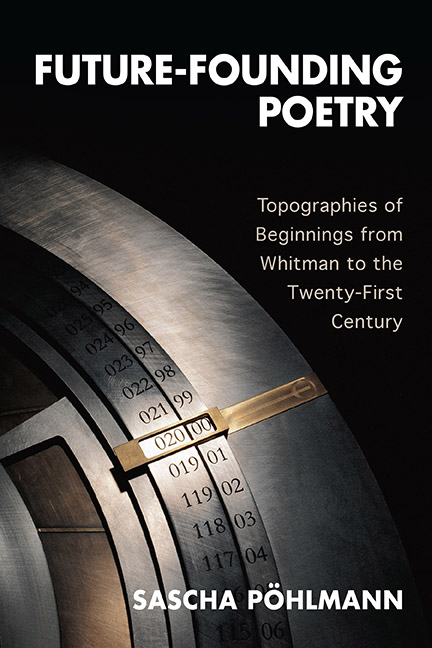Book contents
- Frontmatter
- Contents
- Acknowledgments
- Introduction: On How to Begin, and Where
- 1 Whitman: Beginning American Poetry
- 2 Williams: Beginning Again
- 3 Hughes: Urgent Beginnings
- 4 Rukeyser: Communal Beginnings
- 5 Ginsberg: Defiant Beginnings
- 6 Future-Founding Poetry after 9/11
- Conclusion: On Where to End
- Notes
- Works Cited
- Index
4 - Rukeyser: Communal Beginnings
Published online by Cambridge University Press: 25 May 2021
- Frontmatter
- Contents
- Acknowledgments
- Introduction: On How to Begin, and Where
- 1 Whitman: Beginning American Poetry
- 2 Williams: Beginning Again
- 3 Hughes: Urgent Beginnings
- 4 Rukeyser: Communal Beginnings
- 5 Ginsberg: Defiant Beginnings
- 6 Future-Founding Poetry after 9/11
- Conclusion: On Where to End
- Notes
- Works Cited
- Index
Summary
Something again / is beginning to be born.
—Muriel Rukeyser, “Recovering”GIVEN THE CHOICE OF POETS in this work so far, one may well ask the legitimate question at this point: Is future-founding a male domain? If Whitman is the beginner of future-founding poetry, did he produce a patrilineal (and patriarchal) system of family resemblances among the works of male poets and not among those of female poets? One could certainly conceive arguments as to why this may be the case. For example, in the patriarchal system of American (and Western) culture, the sphere of creativity itself—political as well as artistic—was historically associated with men, and the active participation in the future-oriented construction of imaginative, social, and political structures was not something women were granted very often, neither practically nor theoretically. If the notions of creativity, activity, agency, and power that are so central to future-founding poetry are located so thoroughly in the male domain, then one can imagine why a female poet may find it hard to embrace or embody the practice, or why it may take considerable time and effort to claim it for her own.
The poets discussed so far have exploited such associations of masculinity with creativity for their future-founding endeavors, most of all Whitman, whose persona combines prophecy with male virility and draws much of its agency from a construction of an active and powerful male self. Yet of course one should not draw the wrong conclusions from such an observation. Even though a performance of masculinity has played its part in the future-founding imagination, it is not at all a necessary condition. Future-founding is entirely independent of gender theoretically, even though gender necessarily plays a role in future-founding practically and cannot be dismissed as irrelevant (as if it could anywhere else). While there may be historical sociopolitical reasons why future-founding poetry could have been considered as part of a male domain in a certain time, there are no reasons at all to assume that it is somehow actually limited to such a domain on an abstract level.
- Type
- Chapter
- Information
- Future-Founding PoetryTopographies of Beginnings from Whitman to the Twenty-First Century, pp. 203 - 255Publisher: Boydell & BrewerPrint publication year: 2015



